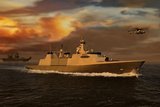Small special operations boats deployed from the German Navy’s four F126 frigates will be outfitted with OSI Maritime Systems' T-ACT tactical and high-speed navigation systems under a deal announced on 20 July.
Twelve Marine Specialised Technology Group (MST) fast raiding interception and special forces craft will be fitted with the systems under an order from MST.
The 12-metre craft will be used by Force Protection (Marines), Marine (Special Forces) and the Operational School from the four F126 frigates being built by Damen Naval.
South African Navy to get OSI T-ACT systems
The prime capability of T-ACT, powered by the Electronic Chart Precise Integrated Navigation System for small craft (ECPINS SC), is high-speed navigation.
Radar, and various navigation sensors are integrated with ECPINS SC software delivering radar control and dedicated NATO Warship Electronic Chart Display Information System (WECDIS)-based high-speed navigation features to the navigator and the driver.
The ECPINS SC software is based on ECPINS WECDIS for surface combatants and submarines, but the human-machine interface and functionality are tailored to small craft operations.
Advanced tactical C2 capabilities are delivered to support planning and coordination of complex small craft operations such as search and rescue, humanitarian aid and disaster relief, non-combatant evacuation, maritime security and amphibious and special forces operations.
F126






















